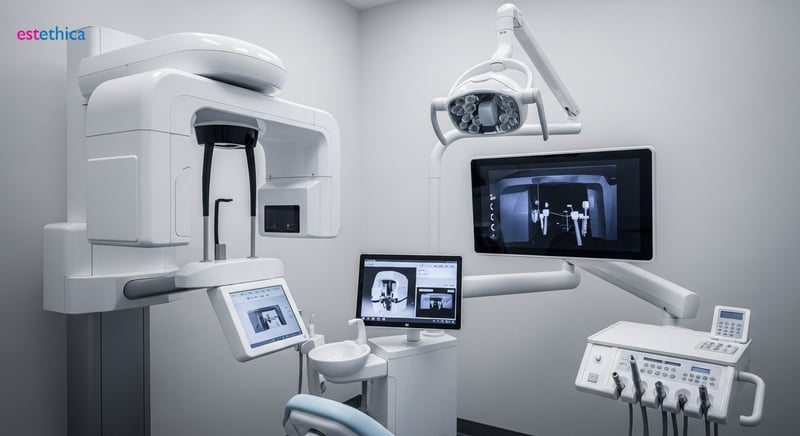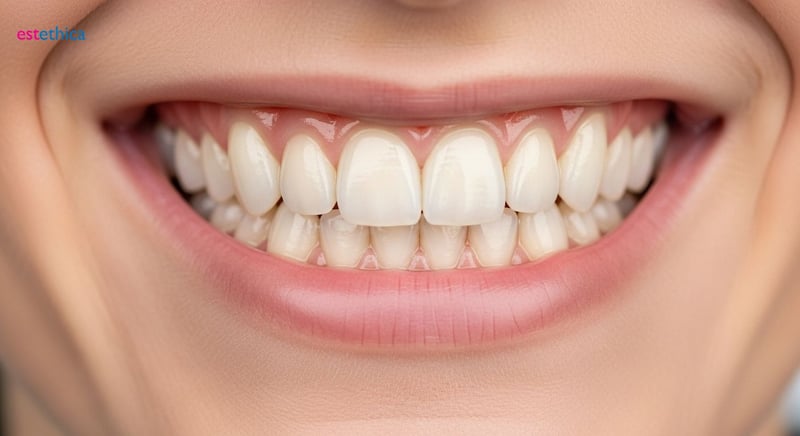Unlock Your Perfect Smile: The Dental Implants Guide
Unlock the secret to confident, enduring smiles with our comprehensive dental implants guide. It's time for your smile's transformation.
Unlock your perfect smile with a comprehensive understanding of dental implants, the modern solution for missing teeth. Delve into the benefits and transformations possible with teeth implants and see why beyond dentures, implants are a game-changer for confidence restoration.
Dental Implants: Your Gateway to Restored Confidence
Exploring the Longevity of Dental Implants
Dental implants are a modern marvel in restorative dentistry, offering a durable and aesthetically pleasing solution for missing teeth. Unlike traditional dentures or bridges, dental implants become a permanent part of your jaw, providing unparalleled stability. The process involves a titanium post being surgically placed into the jawbone. This post then fuses with the natural bone through a process called osseointegration.
The longevity of dental implants stems from this secure integration, which allows them to withstand the everyday stresses of chewing and biting. A significant benefit of implant dentistry is its ability to prevent bone loss. When a tooth is lost, the surrounding bone can deteriorate, leading to changes in facial structure.
- Material Quality: The use of high-quality titanium ensures the implant's durability and biocompatibility.
- Osseointegration: Successful fusion with the jawbone provides a stable foundation for the replacement tooth.
- Proper Maintenance: Regular dental check-ups and good oral hygiene habits are essential for long-term success.
Understanding the Dental Implant Process
The journey to restoring your smile with teeth implants involves several key steps, beginning with an initial consultation and comprehensive evaluation. This assessment allows the dental professional to determine if you're the right candidate for the procedure. Factors such as bone density, overall health, and oral hygiene practices play a crucial role in determining suitability.
Following assessment, a custom treatment plan is developed to meet each patient's individual needs. In some cases, bone grafting may be necessary to ensure sufficient bone structure for implant placement. Implant dentistry offers a dependable option, preventing harm to adjacent teeth.
- Initial Evaluation: Comprehensive assessment of oral health and bone density.
- Implant Placement: Surgical insertion of the titanium post into the jawbone.
- Crown Placement: Attachment of the artificial tooth to the implant.

Implant Dentistry: A Modern Solution for Missing Teeth
Advantages of Choosing Implant Dentistry
With continued improvements in implant dentistry, those who have lost teeth now have a reliable and long-lasting solution. Unlike traditional dentures, dental implants fuse directly with the jawbone, offering a stability that closely mimics natural teeth. This method is especially beneficial because it eliminates the discomfort and slippage associated with removable dentures. Patients often report a significant improvement in their ability to speak and eat confidently.
The benefits of dental implants extend beyond mere aesthetics. By filling the gap left by a missing tooth, implants help prevent the shifting of adjacent teeth, which can lead to bite problems and increased risk of decay. Implants also play a crucial role in maintaining bone density in the jaw. Without the stimulation provided by a tooth root, the jawbone can deteriorate over time.
- Enhanced Comfort: Dental implants eliminate the discomfort of removable dentures.
- Improved Oral Health: Implants prevent teeth shifting and stimulate bone density.
- Increased Confidence: Dental implants improve speech and ease of eating.
Determining Suitability for Dental Implants
While implant dentistry offers a highly effective solution for missing teeth, determining if you're the right candidate is an important first step. Most individuals in good general health are suitable candidates. However, factors such as bone density and the presence of any underlying health conditions can impact the success of the procedure.
A comprehensive evaluation by a dental professional is essential to assess your specific needs and develop a personalized treatment plan. This evaluation typically includes a thorough examination of your oral health. For instance, those with chronic conditions like diabetes may need special consideration and management to ensure the best possible outcome.
- Oral Examination: A thorough assessment of your teeth and gums.
- Health History Review: Discussing any pre-existing health conditions with your dentist.
- Bone Density Assessment: Checking if there is enough bone structure to support the implant.

Dental Implants Before & After: Witness the Transformation
The Emotional Impact of Dental Restoration
The journey with dental implants often extends beyond just the physical transformation, diving directly into the emotional well-being of patients. Initially, those with missing teeth may experience a dip in self-esteem, altering how they interact both personally and professionally. Many find themselves avoiding social situations or hesitating to smile freely. These feelings contribute to a diminished quality of life.
However, the implant dentistry procedure marks more than just a structural change; it often signifies a profound emotional uplift. Seeing the realization of a complete and natural-looking smile boosts self-confidence, encouraging a renewed sense of self. People often report feeling more outgoing and eager to engage in social activities.
- Enhanced Confidence: Regaining a full smile can significantly boost self-esteem.
- Improved Social Interactions: Feeling more comfortable in social settings.
- Overall Well-being: Experiencing a positive shift in overall mood and outlook.
The Functional Benefits of Dental Implants
Beyond aesthetics, affordable dental implants provide crucial support to maintain proper oral function. Before implants, individuals with missing teeth may struggle with basic activities such as chewing, which affects their ability to enjoy a varied diet. This limitation can lead to nutritional deficiencies and impact overall health.
After receiving teeth implants, patients often experience a significant improvement in their ability to eat a wider range of foods comfortably. Dental implants feel and function much like natural teeth, allowing for a more natural bite and chewing motion.
- Improved Chewing Efficiency: Enhanced ability to chew a variety of foods without discomfort.
- Enhanced Nutritional Intake: Experiencing a more varied diet and better nutrition due to improved chewing capabilities.
- Clearer Speech: Overcoming speech impediments caused by missing teeth.

Beyond Dentures: Exploring the Benefits of Teeth Implants
The Superior Stability of Teeth Implants Compared to Dentures
Teeth implants provide a level of stability that dentures simply cannot match. This enhanced stability stems from the direct fusion of the implant with the jawbone, a process known as osseointegration, which offers a secure and permanent foundation for replacement teeth. Unlike dentures, which rest on the gums and can shift during activities like eating or speaking, dental implants remain firmly in place, creating a more natural and reliable solution for missing teeth. With teeth implants, individuals can confidently enjoy their favorite foods without worry.
The fixed nature of teeth implants eliminates common issues associated with dentures, such as gum irritation and the need for adhesives. This not only enhances comfort but also improves overall oral health by reducing the risk of sores and infections. Dental implants act like natural tooth roots, stimulating bone growth and preventing bone loss.
- Enhanced Chewing Function: Implants allow for a stronger and more natural bite.
- Superior Comfort: Fixed in place, implants eliminate discomfort.
- Improved Speech: Prevents slippage and enhances clear pronunciation.
Maintaining Facial Structure with Implant Dentistry
Implant dentistry plays a key role in preserving the natural contours of the face, a benefit not typically provided by traditional dentures. When teeth are lost, the jawbone gradually deteriorates due to lack of stimulation. This bone loss can lead to a sunken facial appearance, premature wrinkles, and an aged look. Teeth implants, by integrating with the jawbone, provide the necessary stimulation to maintain bone density and support the facial structure.
Unlike dentures, which merely sit on top of the gums, the implant dentistry process ensures that the jawbone receives the necessary support to retain its original form. This not only helps maintain a youthful appearance but also prevents changes in the bite that can lead to discomfort and difficulty eating. Individuals who choose teeth implants often experience a higher quality of life due to the combination of improved oral health and aesthetic benefits.
- Bone Stimulation: Implants mimic natural tooth roots.
- Facial Support: Preserves natural facial contours.
- Bite Stability: Prevents changes in the bite due to bone loss.
The Procedure: What to Expect with Dental Implants
Navigating the Dental Implant Timeline
The journey to receiving dental implants is a carefully orchestrated process, requiring both precision and patience. It begins with initial planning, including detailed imaging to assess the jawbone's condition. This phase is vital for determining the optimal placement of the implant. The timeline varies, each stage is crucial for ensuring the implant’s long-term success.
The surgical placement of the implant is performed with great care. Following the surgery, a healing period allows the implant to fuse with the jawbone through osseointegration. Depending on individual healing rates, this can take several months. Once the implant has fully integrated, an abutment is attached, which will support the final prosthetic tooth or teeth.
- Initial Assessment: Thorough planning and bone imaging.
- Surgical Placement: Precise implant insertion by a dental professional.
- Osseointegration Phase: Healing period.
Understanding Factors Influencing Treatment Duration
The duration of the teeth implants treatment can vary based on several factors. One significant consideration is the patient's bone density. Individuals with insufficient bone may require bone grafting. This preliminary procedure adds time to the overall treatment timeline as it necessitates healing before implant placement.
Another key element is the overall health of the patient. Conditions such as diabetes or smoking can slow down the healing process. These factors require careful management to ensure successful osseointegration. Regular follow-up appointments are necessary to monitor progress and address any potential complications.
- Bone Density: Sufficient bone needed for stability.
- Overall Health: Impact of underlying conditions on healing.
- Lifestyle Choices: Effects of habits like smoking on the healing process.
Keeping Your Dental Implants Healthy: Tips and Tricks
Essential Oral Hygiene Practices for Dental Implants
Taking care of your dental implants is crucial to ensure their longevity and prevent complications. Regular oral hygiene is the cornerstone of implant maintenance. Brushing at least twice a day with a soft-bristled brush helps remove plaque and bacteria, preventing gum disease around the implant. Flossing daily is just as important, reaching areas that a toothbrush cannot. Consider using interdental brushes or floss threaders to clean around the implant abutments effectively.
Incorporate an anti-bacterial mouthwash into your routine. This helps eliminate any remaining bacteria and freshens your breath. Remember to choose a mouthwash that is alcohol-free to avoid drying out your mouth, as saliva is essential for maintaining a healthy oral environment. With proper oral hygiene practices, you can ensure your dental implants remain in top condition.
- Brushing Technique: Gentle brushing with a soft-bristled brush.
- Flossing Regularly: Daily flossing or use of interdental brushes.
- Antimicrobial Rinse: Use of recommended mouthwash.
Dietary Considerations and Regular Dental Visits
Your diet plays a significant role in your implant's health. Avoiding hard and sticky foods can prevent damage to the implant and the surrounding structures. Chewing on ice, hard candies, or sticky caramels can put undue stress on the implant, potentially leading to cracks or fractures.
Regular check-ups with your dentist are essential for monitoring the health of your implants. These appointments typically involve a comprehensive examination of the implants and surrounding tissues as well as a professional cleaning. Dentists or dental hygienists can identify early signs of potential problems, such as loose screws or gum inflammation around the implant, and address them promptly. The benefits of regular dental visits include early detection of issues.
- Limit Hard Foods: Avoid chewing on hard items that cause harm to your implants.
- Professional Cleanings: Regular maintenance visits to remove plaque.
- Early Intervention: Addressing minor issues promptly, avoiding complex and expensive corrections.
Understanding Dental Implants: A Comprehensive Guide
Osseointegration Expertise in Permanent Dental Implant Solutions
estethica excels in dental implant procedures, utilizing high-quality titanium posts that fuse with the jawbone through osseointegration. This process ensures the stability and longevity of dental implants, allowing them to withstand the stresses of chewing and biting, closely mimicking natural teeth.
estethica's dental aesthetic services employ world-class technological devices and an expert doctor staff. The clinic focuses on modern restorative dentistry techniques, including custom treatment plans that may involve bone grafting to ensure sufficient bone structure for implant placement, highlighting their meticulous attention to individual patient needs and dental health.
Comprehensive Personalized Care and Enhanced Oral Health Outcomes
estethica's approach to dental implants involves a comprehensive assessment to determine patient suitability, considering factors like bone density, overall health, and oral hygiene practices. Post-implant care emphasizes essential oral hygiene practices, including regular brushing, flossing, and the use of antimicrobial mouthwash to ensure long-term success and prevent complications.
Patients at estethica experience not only physical transformations but also significant emotional upliftment, boosting self-confidence and encouraging renewed engagement in social activities. The clinic's dedication to maintaining facial structure, combined with improved oral health, results in a higher quality of life for those who choose teeth implants.
Frequently Asked Questions
What are the key benefits of choosing dental implants over dentures?
What does the dental implant process typically involve?
How can I ensure the long-term health and success of my dental implants?
What factors determine if I am a suitable candidate for implant dentistry?
Achieve your aesthetic goals with estethica's personalized treatments and expert care.
📞 Book Your Free Consultation!